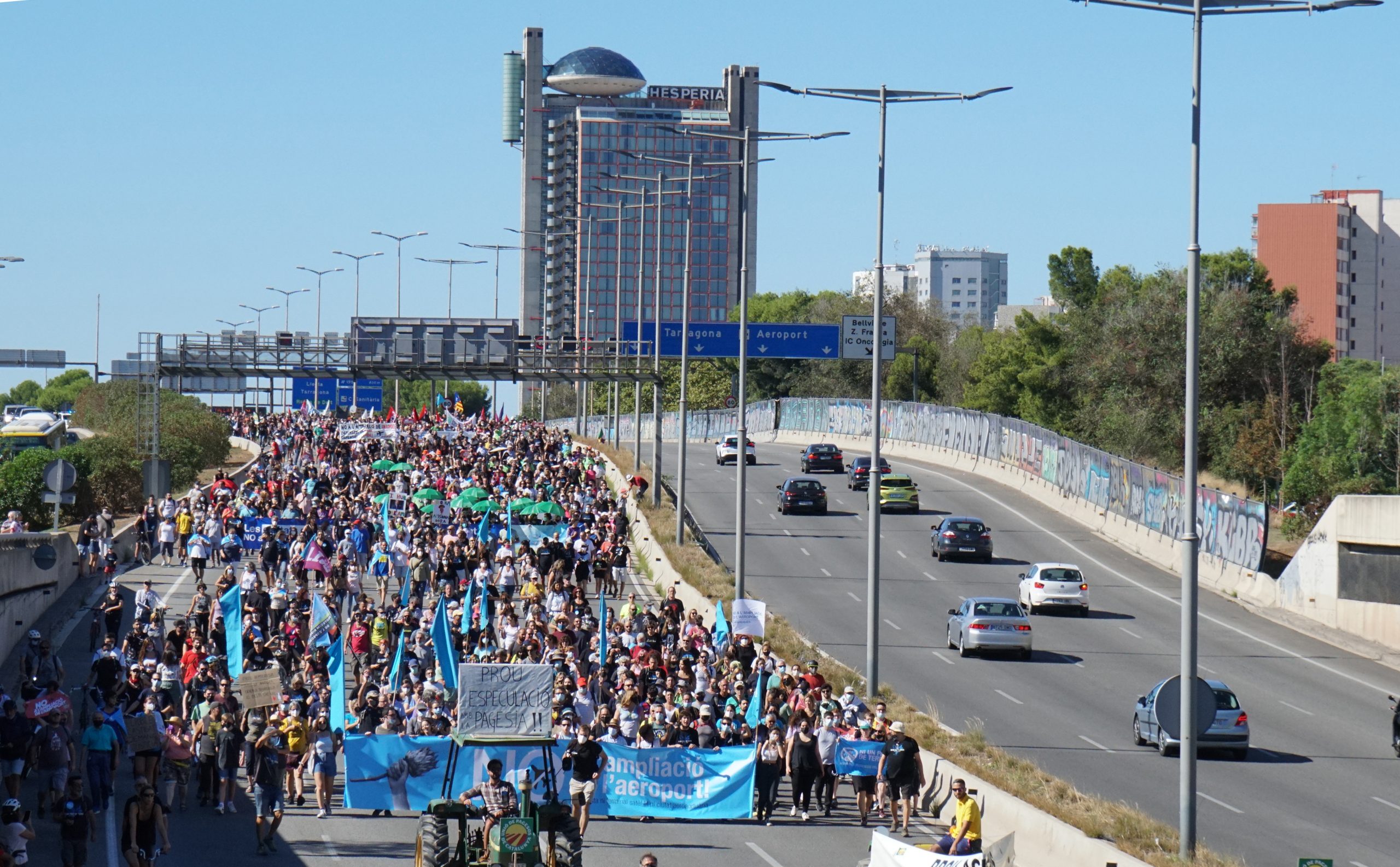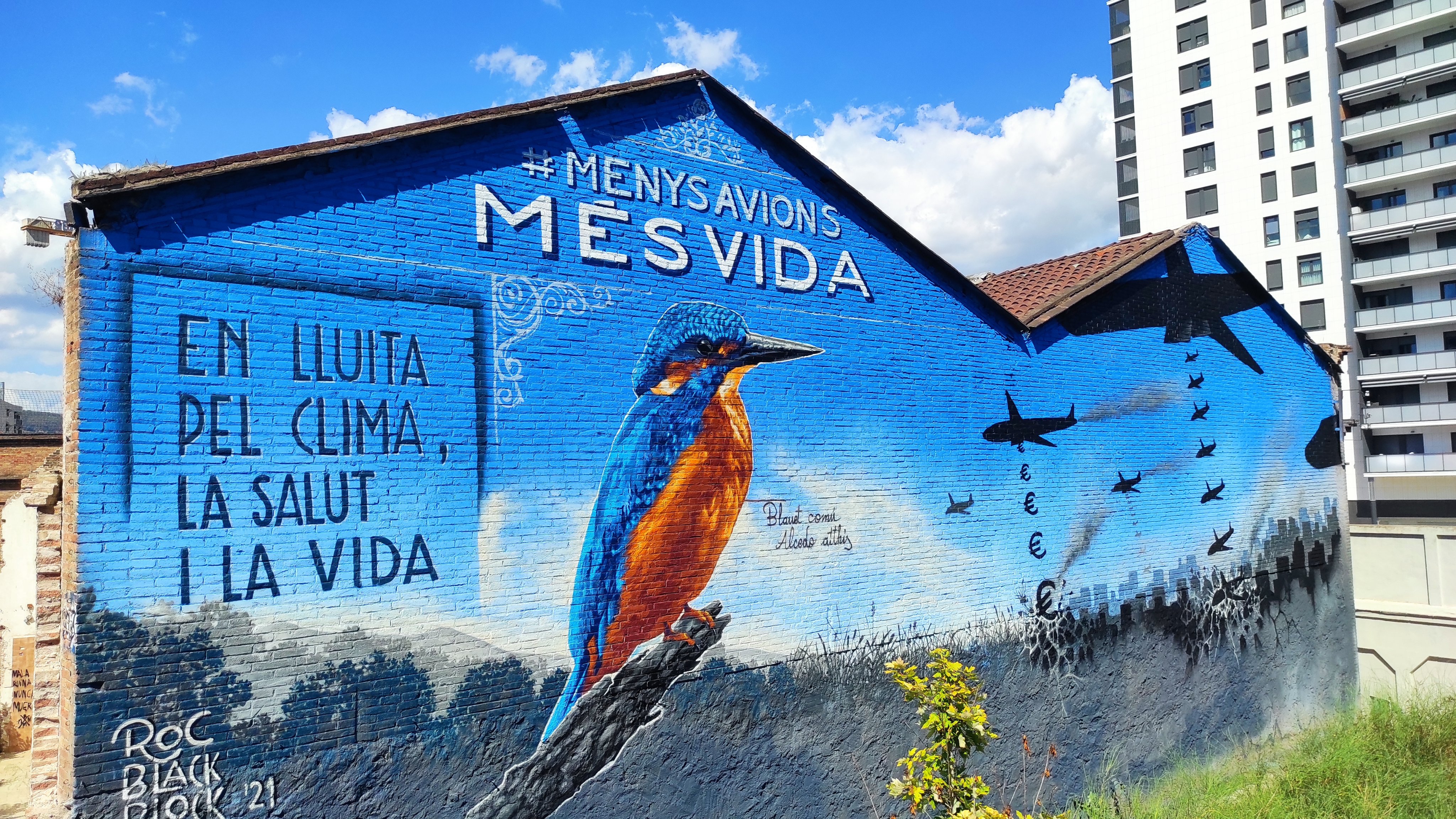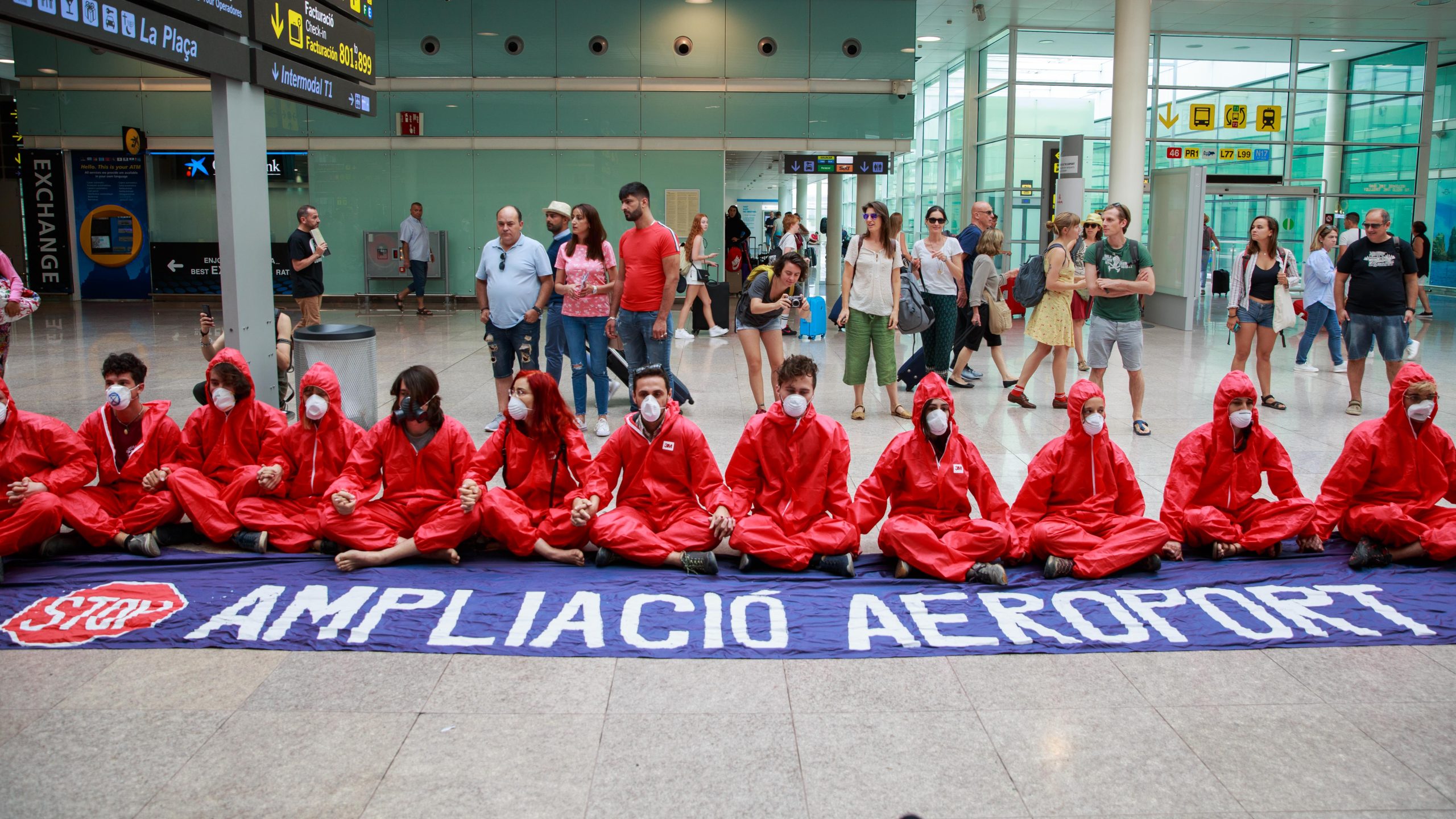Photo: Demonstration against the expansion of El Prat airport, September 2021 (Foto: Marc Garcia)
An article by Franziska Schmidt, with input and feedback from Ariadna Cotén, Zeroport. This article is the result of desk-based research and an interview with Ariadna in June 2025. An important source was an academic paper on the conflict by Sara Mingorría and Ariadna Cotén which was based on analysis and reflections from internal debates within Zeroport and public contributions from members of Zeroport and Stay Grounded.
The decades-old conflict around El Prat airport and the destruction of the Llobregat Delta is one of Europe’s most important environmental justice struggles. The conflict entered a new stage, with airport expansion plans being put back on the table in June 2025.
The proposal threatens the internationally important La Ricarda and Remolar Wetlands and would bring even more intercontinental flights and cruise passengers, further cementing Barcelonaas a hub for mass tourism.
The resistance to this airport project is being led by Zeroport, a diverse coalition of over 150 grassroots organizations, including neighbourhood associations, environmental NGOs, farming cooperatives, climate justice groups and anti-touristification movements. They united around the interconnected themes of overtourism, just urban development and territorial defence and successfully reached out to related struggles elsewhere.
The conflict and mobilisation had culminated when yet another huge extension was announced in 2020. Activists achieved a 5-year expansion freeze in September 2021, but have not been idle: They used the interim to consolidate alliances, connect with regional politicians and educate themselves about other related struggles. Their steady, persistent grassroots organising (what they call ‘ant work’) rather than explosive short-term campaigning anticipated the June 2025 expansion proposal and Zeroport was ready to launch the next round of mobilisation. Crucially, they have two Catalan coalition parties and the European Union’s environmental regulation on their side. What can be learned from the rich history of this struggle?
El Prat in Context
El Prat Airport is situated within the internationally important Llobregat Delta wetland, which enjoys protection under the Natura 2000 network scheme. The delta is not only home to rare wildlife, but also provides drinking water, natural flood control and some of the Mediterranean’s most fertile soils.
Since it was opened in 1918, the airport’s ever-faster growth has gone hand in hand with the development of the nearby port facilities and the advent of mass tourism in Barcelona. The huge Delta Plan extension added a third runway, in 2004, and a new terminal, in 2009, along with an enlargement of the port. It brought total yearly passenger capacity to 55 million and increased the destruction of the Llobregat Delta. In combination with the port expansion, new roads, highways and urbanization lead to 60% of the Delta being concreted over.
Opposition to the delta’s degradation, meanwhile, is decades-old and has historically brought together neighbourhood associations, farmers and environmental groups. These networks formed an important cradle of resistance when yet another expansion plan began to loom in early 2020.
The objective of the government is to transform El Prat into an “international hub” of 70 million yearly passengers and they want to extend the third runway into one of Catalonia’s most important ecological zones, home to 20 EU-designated special conservation areas. Businesses and organisations of employers hailed the plans as a leap toward economic progress, through attracting more intercontinental flights, arguing that a gateway to Asia and easier access for international tourists were needed.
Alongside powerful government, business and lobby support, huge economic interests lurked behind the plans: AENA’s shareholders include BlackRock, Vanguard and Deutsche Bank.
Chronology of Resistance
1970s–2019: Deep Roots
1970s–80s: Neighbourhood movements and environmentalists first organise against the degradation of the Llobregat Delta
1990s–2000s: Local opposition to the Delta Plan is established
2011–2012: The Aturem Eurovegas platform blocks a casino mega-project in the Delta
2012: The NGO Depana files a complaint with the European Commission for the violation of European directives and the deterioration of the delta following the expansion of the airport and port. This ultimately led the European Commission to send a Letter of Infringement to Spain (2021).
July 2019: Stay Grounded’s Degrowth of Aviation conference in Barcelona helps put the airport struggle into a context of systemic critique and allows the groups campaigning against it to forge new alliances and become the seed of Zeroport
2020: New airport developments, new alliances
- January: Spain’s national airport authority, AENA, proposes a €1.7 billion extension to the airport to local and regional authorities
- February: The Zeroport platform is founded with 21 organisations
- March onwards: The pandemic brings the project to a temporary standstill
2021: Mass Mobilization & Political Break
- 19th February: The EU sends a Letter of Infringement to Spain for degradation of Delta
- June: AENA pushes to include the El Prat expansion in Spain’s DORA 2022–2026 airport infrastructure plan
- 8th July: 300+ organizations participate in a major anti-expansion forum
- August: Following business pressure, the Catalan vice president, the Spanish Transport Minister, and AENA back a €2 billion expansion plan
- 8th September: The Spanish Transport Minister announces they are halting the expansion and excludes it from DORA 2022–2026
- 16th September: Zeroport and other environmental justice organisations testify against airport expansions before the Climate Action and Territory Commissions of the Catalan Parliament
- 19th September: A large anti-airport demonstration is held with roughly 20.000 people in Barcelona while sister actions take place in Mallorca and Madrid
2022 –2023: Getting more strategic
- March 2023: 10,000-strong protest “Defensem la Terra” in Barcelona alongside other Catalan anti-development campaigns
- October 2023: Business and employers’ associations present 11 runway proposals, many targeting protected lands
2024–2025: Expansion Plans Revived
- September 2024: The new PSC-led Catalan government prioritises airport expansion
- September 2024: Zeroport joins Palestinian and social movements in denouncing Aviation Week at Barcelona Fair
- Autumn 2024: The Catalan Government re-installs the Airport Technical Committee
- June 2025: The Catalan government formally approved a €3.2 billion expansion, extending the sea runway by 500 m, creating a satellite terminal, and rolling the plan into DORA III (2027–2031)
- 14th June 2025: 1,000+ people march in El Prat with representation from opposition parties and former local officials
- 28th June 2025: Major protest in Barcelona coordinated by Zeroport
- July 2025: Barcelona hosts the conference “Beyond Aviation, Tourism and Capitalism. For a Just Mobility for All” co-organised by Zeroport and Stay Grounded, uniting global movements against airport expansion
Resistance Takes Off Again
Civil society, however, was ready: Within months, a diverse group of actors ranging from environmental organisations, neighbourhood assemblies, climate justice collectives, and anti-touristification platforms through to degrowth advocates joined forces to form Zeroport.
From the beginning, the network linked aviation growth to tourism-based gentrification, property speculation, and social inequality. In this way, they spoke to multiple audiences and avoided narrow and easily dismissable labels like “Not In My Back Yard” (NIMBY-ism) or eco-dogmatism.
The group also positioned itself against the continued enlargement of the Barcelona port, linking the two as interconnected engines of climate and over-tourism. Zeroport activist Ariadna Cotén explains: “They want to expand the airport because they want to bring in more intercontinental flights. And on the other hand, the port authority wants more and bigger cruise terminals. The connection is tourism, as it is a central element that links everything together“.
Challenging Airport Expansion: A Matter of Justice
Zeroport’s critique addresses multiple interconnected issues:
Tourism-based Gentrification: With 73% of flights operated by low-cost carriers and 80% of tourists arriving by air, the airport directly fuels Barcelona’s over-tourism crisis.
Climate Justice: Aviation is responsible for 89% of the carbon footprint of tourism in Barcelona. The airport is already Catalonia’s biggest emitter, generating over 8 million tonnes of CO2 annually – more than double that produced by the city of Barcelona excluding the airport. The expansion would increase CO2 emissions by at least 33%, contradicting Catalonia’s climate commitments.
Health: People living nearby already endure noise levels that far exceed WHO recommendations. The European Court of Justice condemned Spain in 2022 for excessive pollution in the metropolitan area of Barcelona and Baix Llobregat. Expansion would increase noise, pollution and health hazards even further.
Regional Inequality: The airport primarily serves international tourism rather than addressing Catalans’ mobility needs
Speculation: The expansion forms part of broader speculative pressures on Catalonian territory
Severe environmental damage: The project threatens La Ricarda and El Remolar wetlands, while previous expansions have damaged the Delta’s aquifers as well as other protected wetlands and agricultural spaces
Mass Mobilisation
After a lull during the pandemic, things unfolded rapidly in 2021: In June, AENA pushed to include the El Prat expansion in Spain’s 2022–2026 airport infrastructure plan, DORA II. This would lock in national government approval and make the expansion a priority project.
Swift action was crucial: The regional government was undecided about the issue, with the Catalan elections a mere 18 months away. Zeroport launched an intense campaign of organising, media outreach, and local assembly-building. Activists went to neighbourhoods throughout the city to talk about touristification, thereby establishing a link with residents about the issue of the airport. They also built links with campaign groups opposing other mega-projects within Catalonia, such as a resort casino near Tarragona (Aturem Hard Rock) and a new ring road around Barcelona (Aturem B40).
Amidst disagreements between the ruling coalition and vocal public backlash, another long-planted seed of resistance bore fruit: In 2012, Catalan environmental NGO Depana had filed a formal complaint about the airport’s destruction of protected lands. In February 2021, the European Commission finally stated that previous airport developments had indeed violated Natura 2000 protections. Brussel’s firm warning to the Spanish government demanded they extend the Special Protection Area for Birds and comply with protective measures. In September, the Spanish Transport Minister announced that the project had been ‘paused’.
Despite the official suspension, activists wanted to emphasise that they wouldn’t accept a quiet revitalisation of the project later on. Thus, on 19th September 2021, Catalonia’s largest post-pandemic demonstration took to the streets in Barcelona. Neighbourhood groups, environmental NGOs, farmers’ unions, climate justice collectives, such as Fridays for Future and Greenpeace, and activists fighting other mega-developments in Catalonia all attended, demonstrating Zeroport’s wide base and extensive network.
Ariadna reflects: “This outreach work is very important because when we held the demonstration, the only way to make it powerful was to have columns coming from all over: there was a column coming from the Llobregat Valley which filled the entire motorway… and this was very powerful.”
Consolidating the Movement
During the 2021 political and media frenzy over the expansion, Zeroport grew rapidly from 35 to 140 groups. After the 2021 peak, a core remained active in the coalition, with most returning to their local struggles. When things quietened down in 2022 and 2023, Zeroport cleverly shifted its focus: The platform invested in political education and expanded its network beyond Barcelona, strengthening its alliances with movements opposing other Catalan mega-projects.
This culminated in the “Defensem la Terra” mobilisation, which united thousands across Catalonia against extractivist developments and speculative urbanism. Ariadna explains: “The only way to build power is to support other struggles when they need it – and they’ll support you when you do.” Regular events also helped to maintain momentum and keep the issue alive in the public consciousness.
Another example of coalition-building manifested in 2024, when Zeroport aligned with pro-Palestinian and anti-militarist organisations to protest the Aviation Week in Barcelona. This convergence broadened the narrative, showing the connection of aviation not just with environmental degradation, but with colonialism, racism, militarism and the destruction of cities.
Mural “Less planes, more life. Fighting for climate, health and life (Photo and art by Rock Blackblock)
The Next Phase
“We were clear that when the expansion was halted in 2021, after four years we would have the project back on the table, because they don’t rest. Not just AENA and the politicians, the employers’ association, in 2022, already started working on the expansion”, says Ariadna.
Indeed, the 2024 election brought a crucial political shift: the Socialist Party of Catalonia (PSC) came to power in September, explicitly championing expansion as “essential for the Catalan economy.” The imminent closure of DORA II (2021–2026), the key regulatory framework for airport investments, and renewed business lobbying added further momentum.
Thanks to their sophisticated understanding of the political landscape, Zeroport has anticipated developments and used the long lull to focus on outreach. Campaigners have been in ongoing dialogue with left and centre-left parties opposed to the expansion. Two of them, Comuns and ERC, form the new coalition government alongside PSC. The investiture agreement with ERC (Republican Left of Catalonia) includes a binding emissions cap aligned with European Green Deal goals – a commitment activists now intend to hold the party to.
When Catalan president Illa announced a new €3.2 billion expansion plan in June 2025, the response was swift: Over 300 organisations – including environmental, academic, agricultural, neighbourhood, and scientific groups – condemned it in a public statement. ERC and Comuns publicly condemned the plan, with the Comuns hoping Brussels will block it on environmental grounds.
As the activists had anticipated all along, the fight is far from over. The next phase of their resistance will focus on:
- Blocking the new DORA III (2027–2031) infrastructure plan
- Demanding compliance with emission limits negotiated by ERC in the 2024 investiture agreement
- Creating political contacts and pressure with parties like Comuns and CUP
- Organising new mobilizations to keep the issue in the public and political spotlight
- Enhancing European Union pressure around the Natura 2000 infringements
Ariadna remains hopeful, both for Zeroport and for other movements: “No matter how much it seems like you are fighting against very complicated, very large and very powerful infrastructures and lobbies, in the end, if you play your cards right, you can do quite a lot.”
Lessons Learned – What Worked in the Fight Against El Prat?
Building broad alliances: Rural, urban, social, and ecological movements joined forces. Zeroport also reached out to other struggles, using mass tourism and territorial defence as the common denominator
Use inclusive narratives: The fight became not ‘just about a runway or a wetland’ but about climate, housing, tourism, and justice.
Be prepared for the long game: Electoral cycles and political alignments shift, but sustained organising creates leverage. Activists used quiet periods for training and outreach.
Choose strategies wisely: Zeroport combined long-term coordination (“ant work”) with rapid mobilisation and symbolic actions when needed.
Engage all levels: Connecting with local councils and regional parties has amplified leverage.
Play the political field: Using strategic timing and pressure points can achieve a lot, says Ariadna: “It’s about understanding which parties support what, which don’t, which party you can push a little harder, and when. Because this also varies depending on the moment.“
Utilise legal tools: The EU’s 2021 letter of notice remains valid, creating an important pressure point.
Connect with international support: Global networks like Stay Grounded provide visibility, solidarity, and strategic inspiration.
Red Line to Aviation Growth and Mass Tourism at El Prat Airport in July 2019 (Photo: Christine Tyler / Stay Grounded)





